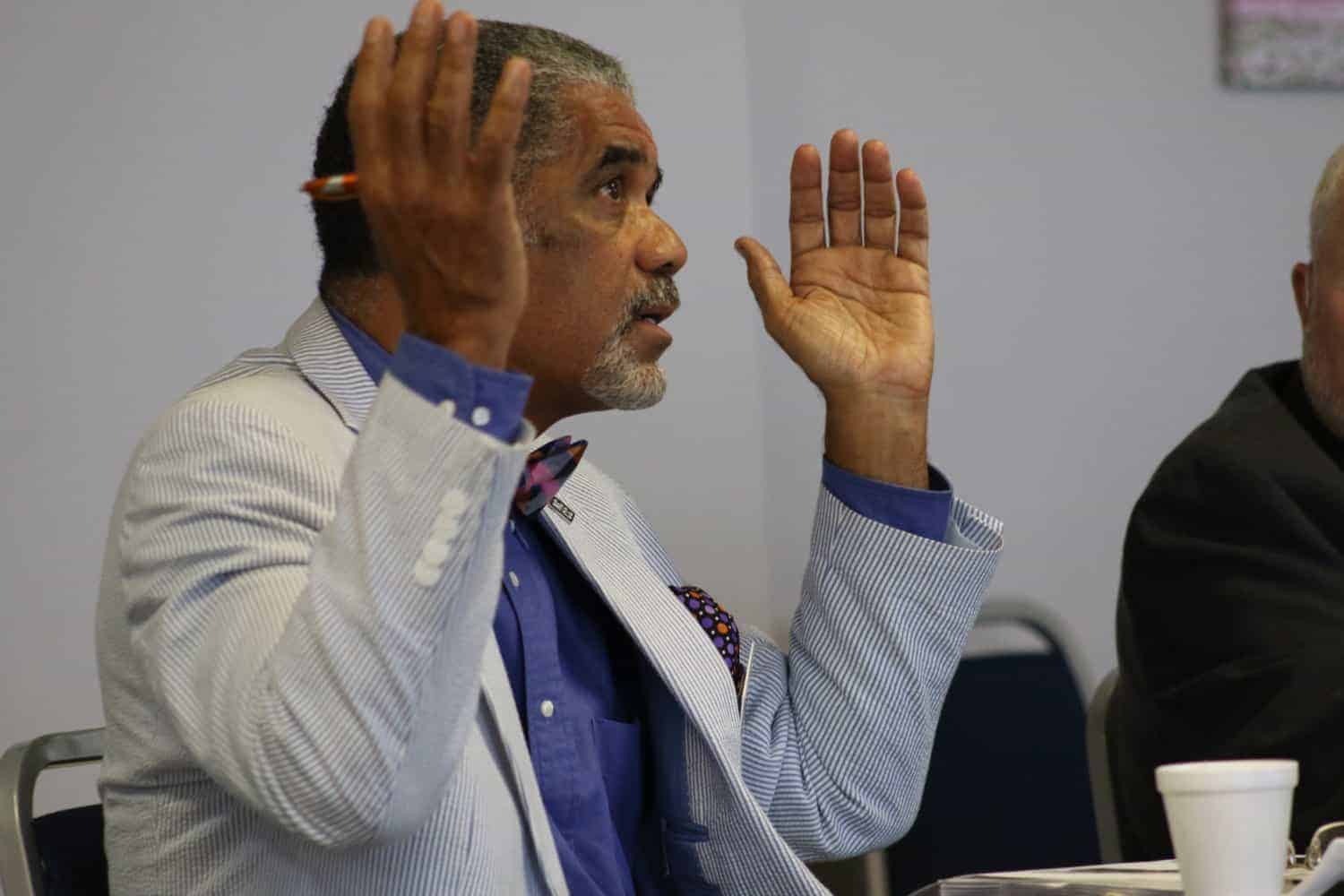Before the State Board of Community Colleges started reviewing programs and policies Friday, board member William Holder called for a moment of silence for Hurricane Florence’s victims.
“… To remember our fellow Carolinians, those who did not make it through the storm, those who lost their homes and probably everything, their worldly possessions, and those who now struggle to get back to normal life as we know it,” Holder said.
With several members calling in who could not make it to Raleigh in the wake of Florence, President Peter Hans reminded the board that 14 community colleges in the eastern part of the state were still closed from storm damage. He predicted half of those schools will open at the start of next week.
For Cape Fear Community College, power remains out and the local school district estimates being closed for the rest of the month. Besides fallen trees, leaking walls, and damaged roofs, Hans said the biggest concern is the displacement of students and faculty.
“The primary impediment to reopening is exactly that, it’s that people have been scattered to the wind,” Hans said. “They evacuated from these areas and in some cases they’re finding it difficult to return or their places of residence are uninhabitable. There are a number of problems for students, faculty, and staff.”
He said he has witnessed a community of support among the 58-college system and its leadership. The system has received calls from presidents across the state asking how to help. Several community colleges served as emergency shelters.
“I’m very impressed with our presidents,” Hans said. “They’ve been very resourceful and resilient. Through very difficult conditions, they’re all offering to help one another, true to the 58-strong spirit.”
David Shockley, president of Surry Community College and 2017 Community College President of the Year, said he was preparing for something like 1989’s Hurricane Hugo when projections were calling Florence a Category 4. “We would have all been in trouble,” Shockley said. “That was what led to that conversation — the damage it would’ve done.”
Both Hans and Shockley have started talking about how to respond in a more coordinated way the next time an emergency happens — especially if the impact were more statewide.
“We’re going to get our heads together, going to try to help the immediate concerns,” Shockley said. “We’re sort of drafting how we could develop statewide guidelines that would help us be more prepared.”
Hans is planning to coordinate a panel of presidents at the next Community College Presidents Association meeting to share lessons in the system’s preparation and response to the storm. He said he was surprised he couldn’t find a handbook or checklist for community colleges and presidents on different issues to consider as the storm approached and hit.
“… Our presidents, particularly new presidents, need something like this, to think about all those issues you’ve got to think through in addition to crisis communications,” Hans said. “This could be a natural disaster or it could be a man-made disaster. These are educators, they’re not naturally … used to a situation like that. They’re not necessarily trained for it.”
Hans passed around a Carolina Journal article about the community colleges’ role in Florence’s aftermath and said he wants to make sure the legislature acknowledges colleges’ needs and support in its upcoming special session.
“We want to be in a position to draw some attention to how community colleges have contributed to reducing the crisis but also how we’ve been affected by it, so that we’re well-positioned for the October 9 short session to be able to help our colleges financially who have suffered during this time,” Hans said.
Board members agreed some guidelines should be created. Holder suggested starting now so details of challenges would not be forgotten. Ann Whitford proposed looking at building materials and roof design as coastal colleges and communities are rebuilt. Lt. Gov. Dan Forest said he flew over the damage this week and saw “hundreds of square miles of land that is underwater.”
“We need to have a proactive plan, so that our students and our faculty and people associated with colleges understand what the implications are going to be if a storm like this hits,” Forest said.
Board member Earnest Pearson added: “It’s going to happen again. I don’t know if it’s two years or ten years, it’s going to happen again.”
Career coaches
The board approved a report to the Joint Legislative Education Oversight Committee on a high school career coach program which has been growing since 2015, when the state legislature started its funding. This past year, the General Assembly gave $2.8 million to fund coaches that work with high school students curious about career options.
Though community college is one of those options, the system office’s Associate Vice President for Student Services J.W. Kelley said the guidance is based on the student’s interests and needs.
“The goal again is to get the student on a clear guided pathway leading to workforce placement, not necessarily grow our career and college promise program,” Kelley said. Career and College Promise allows students to take community college courses for free while still in high school.
As of July 2018, there were 64 coaches across the state. Kelley said one-on-one conversations with students lay out options for students and provide information on certain pathways, as well as let high schools know of needed adjustments to those pathways based on the community’s industry needs.
“That could be what courses they should take, kind of an academic advising, or it could be a career assessment conversation about what path do you want to take and where do you hope to land in the workforce,” Kelley said.
Current legislation requires community colleges to match the state’s funds for the program. The report lays out that impact:
“For example, in the 2017‐19 Cohort, the following colleges were selected and were not awarded funding due to a loss of matching funds: Mayland (2 coaches), Pamlico (1 coach), and Surry (2 coaches). For the 2018‐20 Cohort, due to a loss of matching funds Martin Community College reduced their award from four (4) coaches to one (1) coach, and Robeson Community College requested only one (1) coach.”
Lisa Chapman, the office’s senior vice president and chief academic officer, said this is one challenge that affects different areas in different ways.
“Those barriers tend to have the greatest impact where there’s the greatest need,” Chapman said. “And so, we really do need to look at how we address matching funds.”
The report also details a challenge of coach recruitment and retention and proposes hiring the coaches for three years rather than two. Chapman said job insecurity is a major concern for the coaches.
Board Chair Scott Shook suggested asking the legislature to drop the matching requirement and provide more funding for more coaches. Hans, who agrees that more coaches are needed for such a large state, said Sen. Chad Barefoot, R-Wake, was the program’s main advocate in the legislature and is retiring.
“I think it’s an opportunity for students to get some guidance that they might not otherwise receive from high school guidance counselors, shall we say, because there’s so much in their lap,” Hans said. “… You think about how large the state is, 64 can only have so much impact. There are clearly barriers here. We’re trying to point them out to the legislature. Unfortunately the legislative sponsor of this program is retiring, Mr. Barefoot … We are trying to encourage new champions in this area because I think it’s vital for those students to be aware of those opportunities and perhaps receive some advice and counsel they wouldn’t otherwise receive from the school or at home about the opportunities available.”
Pearson said one option is asking the legislature to base the matching fund requirement on the economic tier of the county. He said vocational options for students are looked down upon and that the career coaches program “is probably one of the most important things we’ve got.”
“I can tell you that there’s nobody in the public school system advocating for kids to find good jobs after school as opposed to four-year colleges,” Pearson said. “And some children are not geared towards a four-year college.”



